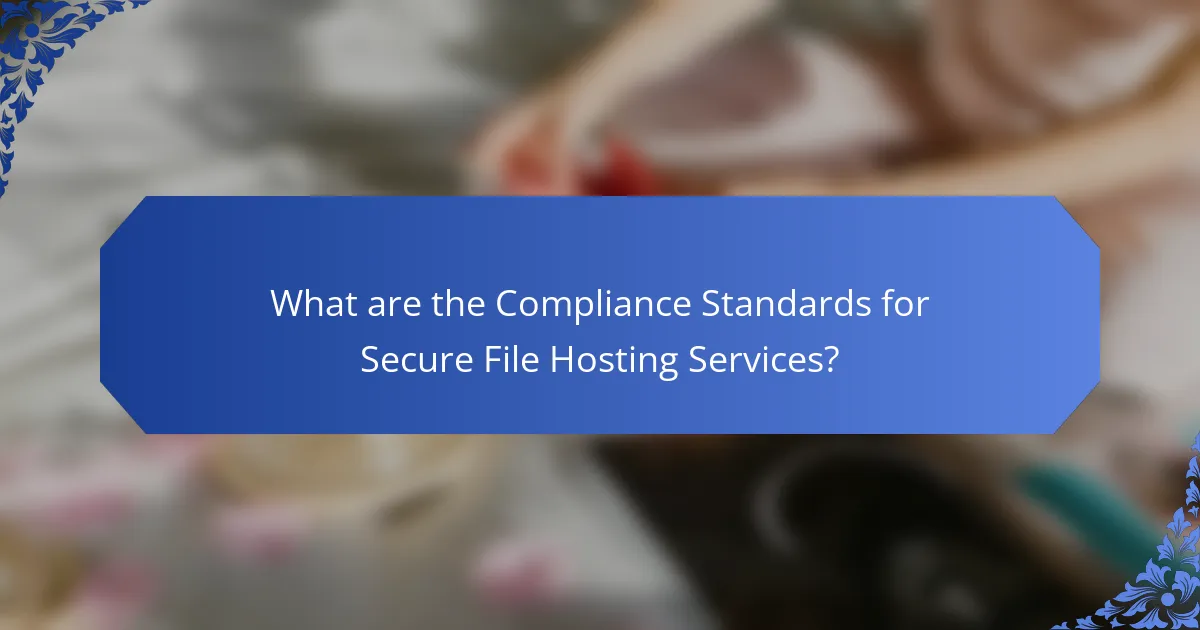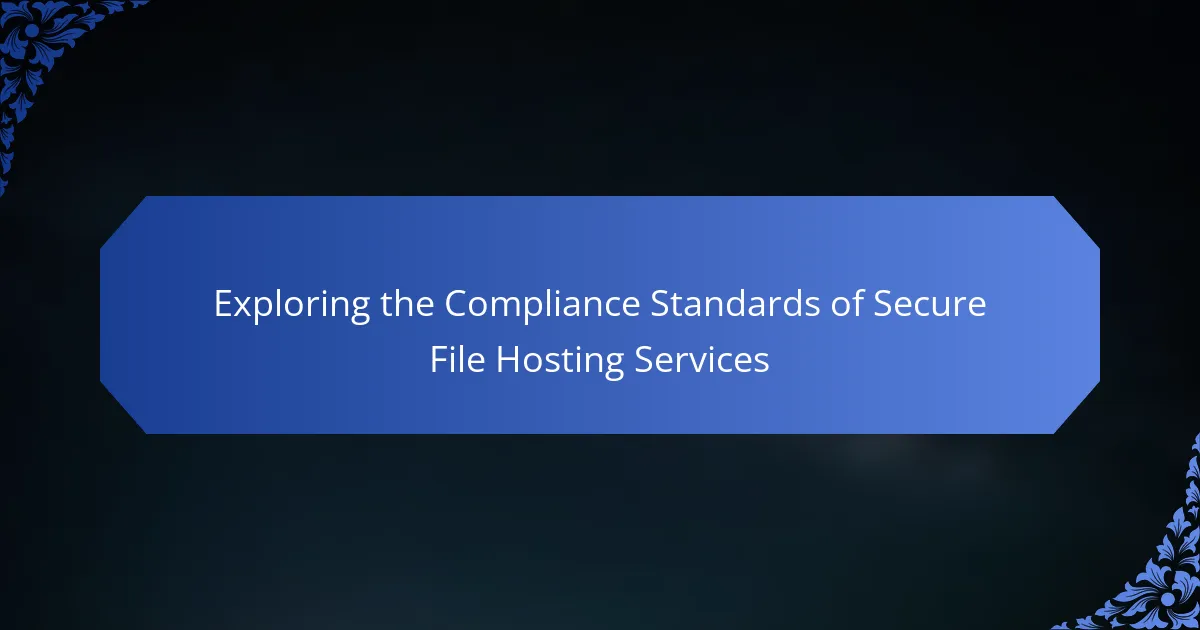Secure file hosting services must comply with various regulations to ensure data protection and security. Key compliance standards include the General Data Protection Regulation (GDPR), which focuses on data privacy in the EU; the Health Insurance Portability and Accountability Act (HIPAA), which safeguards sensitive patient information; and ISO 27001, which outlines a framework for information security management systems. Additionally, adherence to the Payment Card Industry Data Security Standard (PCI DSS) is required for services handling credit card information. Compliance with these standards not only secures data but also fosters user trust, with organizations frequently conducting audits to confirm adherence to these regulations.

What are the Compliance Standards for Secure File Hosting Services?
Compliance standards for secure file hosting services include regulations such as GDPR, HIPAA, and ISO 27001. GDPR mandates data protection and privacy for individuals in the EU. HIPAA sets standards for protecting sensitive patient information in the healthcare sector. ISO 27001 provides a framework for establishing, implementing, and maintaining an information security management system. Additionally, services must adhere to PCI DSS if they handle credit card information. Compliance with these standards ensures data security and builds trust with users. Organizations often conduct audits to verify adherence to these regulations.
How do compliance standards impact the security of file hosting services?
Compliance standards significantly enhance the security of file hosting services. They establish a framework for security protocols that protect sensitive data. Compliance standards, such as GDPR and HIPAA, mandate specific security measures. These measures include data encryption, access controls, and regular audits. Adhering to these standards reduces the risk of data breaches. A report by Verizon indicates that 81% of data breaches are due to weak or stolen passwords. Compliance standards help mitigate these vulnerabilities by enforcing strong authentication practices. Therefore, compliance not only ensures legal adherence but also fortifies overall security in file hosting services.
What are the key compliance frameworks relevant to secure file hosting?
The key compliance frameworks relevant to secure file hosting include GDPR, HIPAA, and PCI DSS. GDPR governs data protection and privacy in the European Union. It mandates strict guidelines for data handling and storage. HIPAA sets standards for protecting sensitive patient information in healthcare. It requires secure storage and transmission of health data. PCI DSS is essential for organizations handling payment card information. It outlines security measures to protect cardholder data. Compliance with these frameworks ensures legal protection and enhances data security for file hosting services.
How do these frameworks differ in terms of requirements?
Different frameworks for secure file hosting services have varying requirements based on their compliance standards. For instance, GDPR emphasizes data protection and privacy for individuals within the EU, mandating explicit consent for data processing. In contrast, HIPAA focuses on safeguarding health information, requiring stringent security measures for electronic health records. PCI DSS sets requirements for payment data security, emphasizing encryption and access controls. Each framework outlines specific documentation and auditing processes to ensure compliance. These differences highlight the diverse regulatory landscapes that secure file hosting services must navigate to meet legal obligations.
Why is compliance essential for secure file hosting services?
Compliance is essential for secure file hosting services to ensure data protection and privacy. Adhering to regulations like GDPR and HIPAA safeguards sensitive information. Compliance helps build trust with users, as they feel their data is handled responsibly. It minimizes the risk of data breaches, which can lead to severe financial penalties. Many compliance standards require regular audits and assessments, enhancing overall security measures. Organizations that fail to comply may face legal repercussions and damage to their reputation. Thus, compliance is a foundational element for maintaining a secure file hosting environment.
What risks are associated with non-compliance?
Non-compliance with regulations poses significant risks to secure file hosting services. These risks include legal penalties, which can result in fines and sanctions. Organizations may face reputational damage, leading to loss of customer trust. Additionally, non-compliance can result in data breaches, exposing sensitive information. This exposure can lead to costly remediation efforts and potential lawsuits. Furthermore, businesses may encounter operational disruptions due to investigations or audits. Overall, the financial impact of non-compliance can be substantial, often outweighing the costs of adhering to compliance standards.
How does compliance enhance user trust and service credibility?
Compliance enhances user trust and service credibility by ensuring adherence to established regulations and standards. When secure file hosting services comply with legal and industry requirements, users feel more confident in the safety of their data. Compliance demonstrates a commitment to protecting user information and maintaining high operational standards. For example, services that follow GDPR regulations are seen as trustworthy due to their focus on user privacy. Additionally, compliance often involves regular audits and assessments, which further validate the service’s reliability. This transparency fosters a positive reputation, encouraging users to engage with the service. Ultimately, compliance acts as a foundational element in building lasting trust between users and service providers.
What are the common compliance certifications for secure file hosting services?
Common compliance certifications for secure file hosting services include ISO 27001, SOC 2, and HIPAA. ISO 27001 is an international standard for information security management systems. It provides a framework for managing sensitive company information. SOC 2 focuses on data security, availability, processing integrity, confidentiality, and privacy. HIPAA is essential for services handling protected health information, ensuring data privacy and security. These certifications demonstrate a commitment to maintaining high security and privacy standards in file hosting services.
What does obtaining an ISO 27001 certification entail?
Obtaining an ISO 27001 certification entails implementing an Information Security Management System (ISMS). This process includes identifying and assessing information security risks. Organizations must establish policies and controls to mitigate these risks. Documentation of procedures and policies is required for compliance. Regular audits are necessary to ensure adherence to the standard. Certification is granted by an accredited body after successful evaluation. ISO 27001 is recognized globally, enhancing trust and credibility in information security practices.
How does GDPR compliance affect file hosting services?
GDPR compliance significantly impacts file hosting services by imposing strict data protection regulations. These services must ensure that personal data is processed lawfully, transparently, and for specific purposes. They are required to implement robust security measures to protect user data from breaches. Additionally, file hosting services must facilitate users’ rights, such as access, rectification, and erasure of their data. Non-compliance can result in hefty fines, reaching up to 4% of annual global turnover or €20 million, whichever is higher. This financial risk compels file hosting services to prioritize compliance. Furthermore, GDPR mandates that data processors and controllers establish clear contracts outlining data handling practices. This ensures accountability and transparency in data management. Overall, GDPR compliance shapes the operational frameworks of file hosting services, influencing their policies, security protocols, and user interactions.
How can secure file hosting services ensure ongoing compliance?
Secure file hosting services can ensure ongoing compliance by implementing robust security protocols and regular audits. These services must adhere to industry standards such as GDPR, HIPAA, or ISO 27001. Regularly updating security measures is essential to protect sensitive data. Staff training on compliance regulations also plays a critical role. Additionally, maintaining clear documentation of compliance efforts is necessary for accountability. Engaging third-party assessments can provide unbiased evaluations of compliance status. Monitoring changes in regulations helps services stay aligned with legal requirements. These practices collectively enhance the reliability of secure file hosting services in maintaining compliance.
What best practices should be implemented for compliance maintenance?
Best practices for compliance maintenance include regular audits, employee training, and clear documentation. Regular audits help identify gaps in compliance and ensure adherence to regulations. Employee training fosters a culture of compliance and keeps staff informed about legal requirements. Clear documentation provides a comprehensive record of compliance efforts and decisions. Implementing a compliance management system can streamline processes and enhance oversight. Additionally, staying updated on regulatory changes is crucial for ongoing compliance. These practices collectively support a robust compliance framework in secure file hosting services.
How can regular audits contribute to compliance assurance?
Regular audits enhance compliance assurance by systematically evaluating adherence to regulations. They identify gaps in compliance processes and highlight areas needing improvement. Audits provide a structured approach to monitoring compliance with industry standards. Regular assessments ensure that organizations remain up-to-date with changing regulations. They also foster accountability by assigning responsibility for compliance tasks. Furthermore, audits can reveal trends in compliance failures, enabling proactive measures. Research shows that organizations conducting regular audits are 30% more likely to meet compliance requirements consistently. This ongoing scrutiny builds a culture of compliance within the organization.
What are the challenges in achieving compliance for secure file hosting services?
Achieving compliance for secure file hosting services presents several challenges. These challenges include the complexity of regulatory requirements. Different regions impose varying standards, making compliance efforts intricate. Additionally, frequent changes in regulations require constant updates to compliance strategies. Organizations often struggle with data security measures that meet compliance mandates. Ensuring user privacy while maintaining accessibility is another hurdle. Furthermore, the integration of compliance tools with existing systems can be technically challenging. Staff training on compliance protocols is often inadequate, leading to human error. The cost of implementing and maintaining compliance measures can also be prohibitive for some organizations.
What specific obstacles do providers face in meeting compliance standards?
Providers face several specific obstacles in meeting compliance standards. One major obstacle is the complexity of regulations. Compliance requirements vary significantly across different jurisdictions. This creates confusion for providers trying to navigate the legal landscape. Additionally, providers often struggle with limited resources. Many organizations lack the necessary staff or technology to implement compliance measures effectively.
Another challenge is the evolving nature of compliance standards. Regulations frequently change, requiring ongoing adaptation from providers. This can lead to increased operational costs and resource allocation. Furthermore, providers may encounter difficulties in data security. Protecting sensitive information is critical but can be technically challenging.
Finally, communication gaps between departments can hinder compliance efforts. Effective collaboration is essential for understanding and implementing compliance standards. These obstacles collectively complicate the compliance landscape for secure file hosting service providers.
How can technology assist in overcoming compliance challenges?
Technology assists in overcoming compliance challenges by automating processes and ensuring accurate data management. Automation reduces human error, which is a common compliance risk. For instance, compliance software can track regulatory changes in real-time. This allows organizations to adapt quickly to new requirements. Additionally, data encryption and secure access controls enhance data protection. According to a study by PwC, 86% of organizations believe that technology improves their compliance efforts. This demonstrates that leveraging technology can significantly streamline compliance management.
What practical tips can enhance compliance in secure file hosting services?
Implementing strong access controls enhances compliance in secure file hosting services. Ensure that only authorized users can access sensitive data. Regularly update user permissions based on role changes. Utilize multi-factor authentication to add an extra layer of security. Conduct regular audits to identify compliance gaps and rectify them promptly. Maintain comprehensive logging of all user activities to facilitate accountability. Provide ongoing training for employees about compliance policies and data protection practices. Regularly review and update security policies to align with evolving regulations and standards.
The main entity of this article is secure file hosting services, which are subject to various compliance standards such as GDPR, HIPAA, and ISO 27001. The article provides an overview of these compliance frameworks, detailing their specific requirements and implications for data security and user trust. It discusses the importance of compliance for protecting sensitive information, the risks associated with non-compliance, and best practices for maintaining adherence to regulatory standards. Additionally, the article highlights the role of technology in overcoming compliance challenges and the significance of regular audits and employee training in ensuring ongoing compliance.
